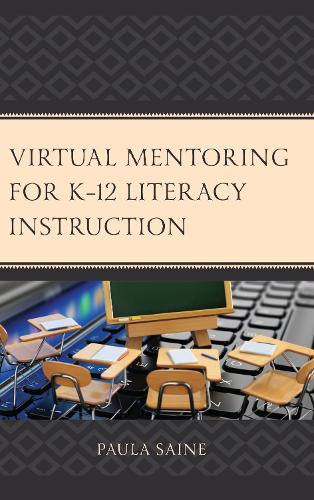
Virtual Mentoring for K12 Literacy Instruction
(Paperback)
Available Formats
Publishing Details
Virtual Mentoring for K12 Literacy Instruction
By (Author) Paula Saine
Bloomsbury Publishing PLC
Rowman & Littlefield Publishers
12th October 2018
United States
Classifications
Professional and Scholarly
Non Fiction
Educational: Language, literature and literacy
Educational equipment and technology, computer-aided learning (CAL)
Educational: First / native language: Reading and writing skills
Teaching skills and techniques
372.34
Physical Properties
Paperback
172
Width 152mm, Height 221mm, Spine 14mm
363g
Description
There is no research-based text that provides a model for teaching and learning in a virtual environment with literacy learners. Therefore, this book will focus on preparing challenging students to be successful independent learners for the twenty first century. This will involve one where students are constructing their own meaning not only within the traditional brick and mortar environment with the assistant of the classroom teacher, but also in an online environment scaffolded by a virtual tutor. Today, virtual environments are a common alternative space for students in K12 to engage in meaningful online literacy learning with their tutors (Boxie, 2004; Hurst, 2007; Williams & Casale, 2015; Witte, 2007).
Reviews
I am delighted to see Dr. Saines work on virtual mentoring.While it is easy to become distracted with exciting apps and programs that provide virtual literacy instruction; it is important that our focus is on the best practices of the human being delivering the instruction. Dr. Saines research is critical to ensuring that virtual instruction is effective.The potential of high quality virtual literacy instruction, as Dr. Saine details in her path-breaking book, is the wonderful opportunity to deliver effective instruction as well as a practice insocial justice- delivering in an equitable manner to children of all locations and socio-economic backgrounds. -- Maria Hanna, superintendent, Ohio Connections Academy
Excellent book for teachers, parents, students, and literacy professionals who want to make a difference in reading and writing for all through skillfully orchestrated use of available technology and online tutoring to meet reading needs.Clearly written with relevant research and wonderfully detailed examples of students using well-planned instruction to meet individual needs in various contexts, such as a summer camp context with virtual and human tutoring. -- Bonnie J. F. Meyer, professor of educational psychology, The Pennsylvania State University
In this book, Professor Saine provides succinct, granular best practices for supporting student engagement in traditional brick and mortar school environments with the assistance of a virtual mentor in an online space. I look forward to implementing this progressive framing of virtual mentoring of students in K-12 literacy instruction as we support learners and educators in current and future literacy practices. This book is sure to have profound impact on the ways in which we communicate, socialize, connect and learn in our classrooms. For this, and more, Professor Saine's book deserves the highest praise. -- W. Ian O'Byrne, professor of literacy education, College of Charleston
With its innovative and practical ways of using digital technologies to virtually mentor students, this book can be used by K-12 teachers and preservice teachers to promote literacy development and engagement. The recommended digital resources are excellent options for virtual mentors and are appropriate for the support of a wide range of literacy skills, including phonics, fluency, comprehension, and writing. This is a significant contribution to the field of literacy and technology. -- Julia Kara-Soteriou, professor of literacy education, Central Connecticut State University
Author Bio
Paula Saine, PhD, is Professor of Teacher Education at Miami University in Ohio where she teaches courses in literacy and technology. She is an internationally recognized leader and expert. Her research centers primarily on three important and interrelated principles that include: literacy, cultural competence, and the use of digital technologies in K12. Together, they shape her research on fostering interactive literacy learning through innovative approaches that equip practicing and current teachers for an ever-changing society.
